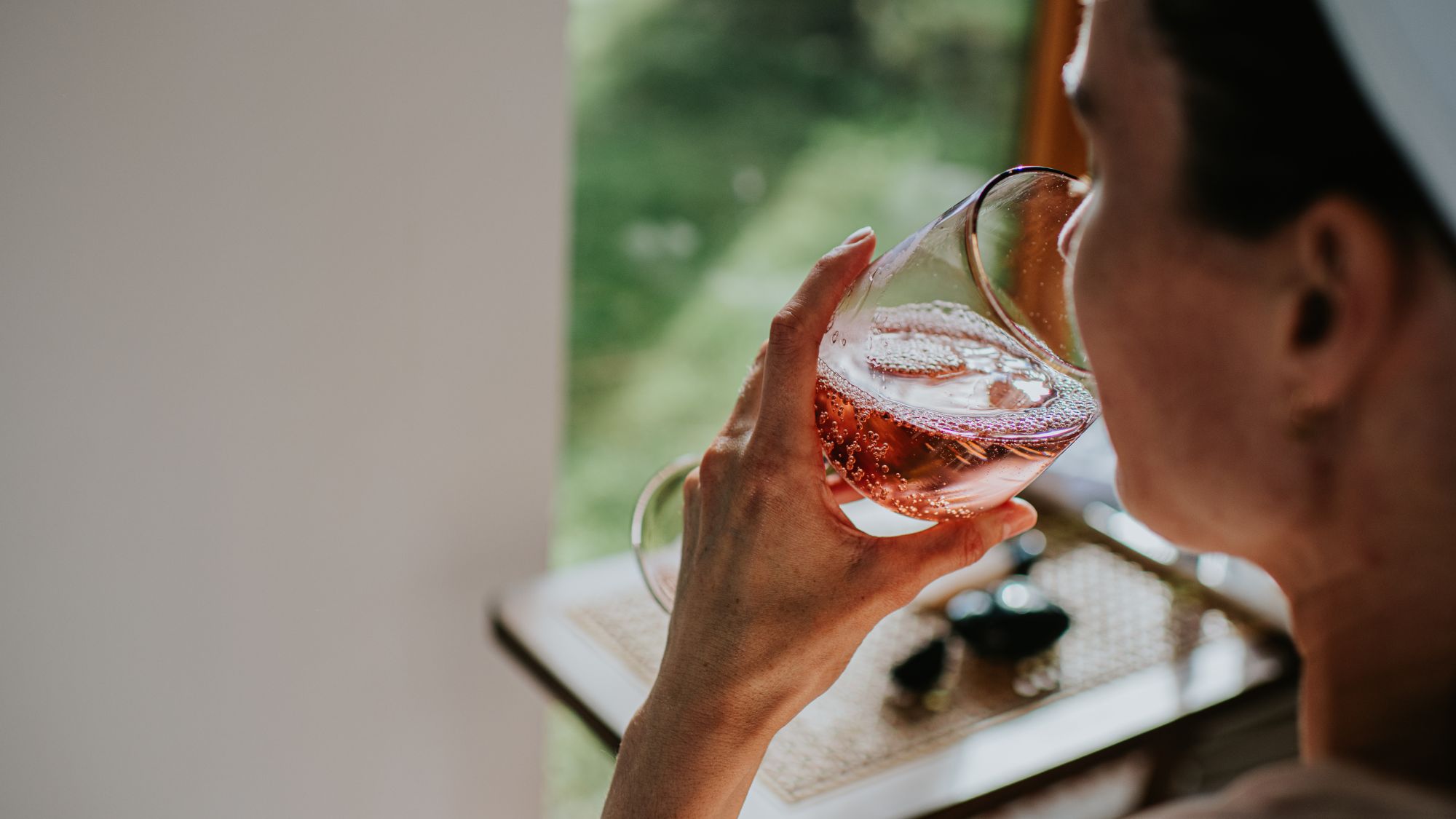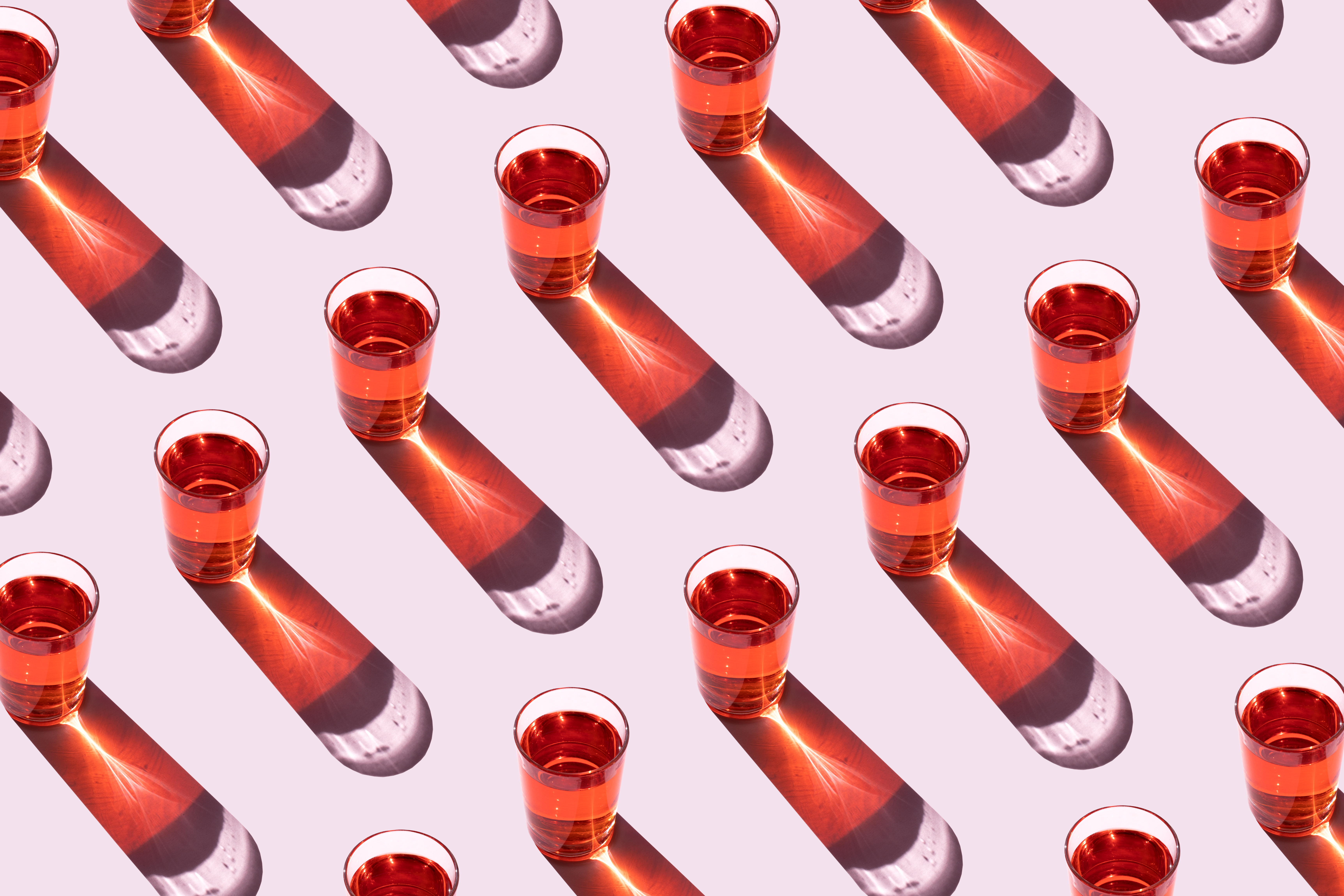Attempting to drink more mindfully this year? What happened when one writer gave up alcohol for 21 days
Here, she serves as inspiration for cutting down.


Celebrity news, beauty, fashion advice, and fascinating features, delivered straight to your inbox!
You are now subscribed
Your newsletter sign-up was successful
By now, you'll have guessed from the headline that I tried 21 days no alcohol to see if it improved my liver health. But before I get into the details, answer this: how much do you drink on an average night out?
Two glasses of Prosecco? Three? A bottle - or two?
No judgement here. Personally, I fall on the latter end of the scale (plus an added couple of Tequilas for good measure). I’ll readily admit it – I’m a binge drinker. I’d never buy a bottle of wine to drink on a school night, but as soon as the weekend hits it’s a different story. I’ll spend Saturday evening knocking back the bubbles and Sunday afternoon glued to the couch eating toasted sandwiches and gulping down mugs of gravy (it’s a cure, don’t @ me).
I’m definitely not alone - the UK has a bit of a bad rep when it comes to alcohol, according to a study by Drink Aware, 27% of Brits were identified as binge drinkers because they consumed more than six to eight units (between two large glasses of wine to four low-strength pints) in a single session. Although many of you are currently opting for Dry January, the Office for National Statistics found that 7.8 million people in the UK alone binge drink.
The last year hasn't helped - stats revealed the majority of people in the UK drunk more heavily throughout the lockdowns. Now the world is (nearly) back to normal, visiting rooftop bars, boozy brunch locations and your favourite restaurants once more has made the emphasis on social drinking even more acute.
I tried 21 days no alcohol: would it improve my liver health?
Giving up your favourite tipple for just over four weeks of the year can reportedly aid weight loss, decrease blood pressure, and reduce the risk of diabetes. On top of that, it’ll supposedly give you a healthy glow, shiny eyes and a new lease of life.
Waking up one morning with no memory of getting home and an empty bank account, I decided I wanted to try going dry. I was desperate to see if 21 days without shots and bubbles would really make a difference to my health.
Celebrity news, beauty, fashion advice, and fascinating features, delivered straight to your inbox!
My life might be wildly different. I'd be smugly running 10ks on a Sunday morning and I’d never avoid reading my Whatsapp sent messages again.
But first, I needed to know what was going on inside. I had to find out what state my liver was in.
I booked an appointment with Consultant Hepatologist Dr. William Alazawi at The Princess Grace Hospital, part of HCA UK, about whether 21 days off the sauce can really make a difference to your liver health.
"Let’s say it’s Friday night, how much would you drink?," he starts.

I cringe and consider offering a conservative estimation instead. We work out that my weekendly two-and-a-half bottles of Prosecco plus a couple of tequilas gave me a grand total of 26 units. Add to that what I’d drink if I had mid-week dinner plans and my average weekly total, rather worryingly, became 30 units.
For context, the recommended weekly is fourteen. FOURTEEN. I start to panic a little about what I’d been doing to my poor liver for the last 10+ years. How much does an individual have to drink before it starts having a negative impact?
Unfortunately, he tells me that there is no one-size-fits-all answer.
"What we know is that continued harmful drinking at a very high level in excess of those recommended limits increases your risk of developing liver problems. But that’s not to say that everybody who drinks more than that is going to end up with cirrhosis," he explains.
So can thirty booze-free days really make a difference if you’ve spent as many years as I have torturing the poor organ?
"If you stop drinking for a month, I can’t guarantee you that every last wisp of scar tissue will go away, I can’t guarantee you that the fat will go away, so I can’t guarantee you that your Fibroscan score will get better," Dr Alazawi admits.
"But by stopping drinking, it can give a bit of breathing space. If someone is otherwise healthy, eats well, has no underlying genetic abnormalities that may predispose you to liver disease, then stopping drinking can help."
It was time to bite the bullet and see what was going on.
So what is a Fibroscan?
A Fibroscan is essentially an ultrasound of the liver to test its condition and get a good idea of how fatty and stiff it is. It’s non-invasive, instead checking for inflammation using high-frequency sound waves. The quicker the sound bounces back, the more supple the liver, and the more supple the liver, the healthier it is.
"The most common thing we find when we do a scan is a bit of fat in the liver," Dr Alazawi explains.
"Fat in the liver may represent being overweight, it might be associated with diabetes, high blood pressure and cholesterol - or it might be related to alcohol."
"Over time, what can happen is that the liver can become very fatty. While that in itself doesn’t harm the liver, in some people the fat and alcohol can injure the liver cells themselves. So they’re no longer just sitting there with fat inside them but they’re actually now being damaged."
"There’s inflammation because that’s our body’s response when there’s any damage, and if the injury doesn’t go away then you get scar tissue, and that scar tissue is called fibrosis and the extreme end of this is called cirrhosis. The scar tissue is harder than normal soft, supple liver tissue and that’s where the Fibroscan comes in."
Dr. Alazawi began the examination by lightly knocking at my right side, attempting to find a good hollow point. Thanks to some rather inconveniently placed ribs, it took a little longer than expected to find the sweet spot. But once we got there, it was over in just a few minutes.
Using a pen-like device, he gently prodded the spot where my liver could most easily be examined through my awkwardly positioned bones and the readings began appearing on the screen. With every light pulse, new numbers and images appeared that I couldn’t decipher, but they were rating my liver for fattiness and scarring/inflammation.
After ten light pops, it was done. Easy. So what did it tell me?
As expected, the Fibroscan detected that my liver was a little on the tough side. Slightly stiffer than it should be, but nothing to be too concerned about, apparently. Phew. Maybe I could reverse the damage after all. But could I do it in 21 days?

The results?
I decided to conduct this experiment during a period when I knew there would be plenty of opportunities to drink – December. As my family and friends knocked back flute after flute, I was sipping on soda waters with fresh lime.
But I did it. 21 days without drinking – I felt like a new woman. I was sleeping better, I was more sociable on the weekends and my skin definitely looked brighter. Not to mention the money I saved. I was happy to bow out early at parties, meaning no costly 3am Ubers, and I was free of ‘The Fear’.
Satisfactorily smug, I skipped back to the London Digestive Centre to see Dr. Alazawi and find out if my booze-free stint had made a difference to my slighter-tougher-than-it-should-be liver.
And the results were surprising. The Fibroscan read that my liver had indeed softened up dramatically after just 21 days – but the test also revealed that it was fattier. Huh?
The reason for this, Dr Alazawi explains, could be that the tests are not usually repeated so close together and the amount of fat in the liver does vary a lot from day to day. Also, when it comes to excessive fat it’s usually down to a combination of things: a healthy diet and lifestyle also come into play. So while cutting out alcohol over an extended period of time can help a fatty liver, it’s important to remember that it’s not the only cause. While the Fibroscan is used as an indication of liver health, it’s not an exact science.
"The other issue is it’s not just your liver," Dr Alazawi explains.
"[Alcohol] can affect the heart, the skin, the reproductive system, the brain, your kidneys. There are a lot of ways that alcohol can affect your body."
But if thirty days booze-free doesn’t make that much difference to your liver, should you bother with these ‘detoxes’ or are they all just a fad?
"If by stepping away from the booze for a period you also think about your diet, more home workouts, if it makes you sleep better, gives you a better sense of wellbeing, makes you practice positive thinking, whatever it may be…. then it’s probably a good thing," he continues.
"People might think about how they feel when they drink less, and that may well have a resetting beneficial impact throughout the year."
Who should have a Fibroscan?
According to Dr Alazawi, NICE recommends that if a woman drinks more than 35 units a week, and a man 50, and they’re worried about their alcohol consumption, they should have a Fibroscan.
However, it can also give a good indication of what else is going on with your body – as I found out.
A week after my consultation, I got a phone call from Dr. Alazawi. Something had caught his attention after our meeting. Following the Fibroscan, I had several blood tests under his instruction just to make sure that everything was okay, and they detected that I potentially have an underactive thyroid which would need to be monitored regularly and could result in me taking lifelong medication. It’s something that affects my mum and sister, but without having the test done, I would have been none the wiser.
So whether you’re a binge or heavy drinker, or just want a peek at what’s going on with your liver, the Fibroscan can be used as a tool to see inside and get a good glimpse of your health.
For information, prices and to book a Fibroscan, visit hcahealthcare.co.uk.

Jadie Troy-Pryde is News Editor, covering celebrity and entertainment, royal, lifestyle and viral news. Before joining the team in 2018 as the Lifestyle and Social Media Editor, she worked at a number of women’s fashion and lifestyle titles including Grazia, Women’s Health and Stylist, and now heads the Marie Claire UK news desk.